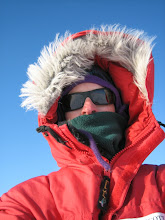At the turn of the 20th century the South Pole had not yet been visited by man. In 1911, Robert Falcon Scott and Roald Amundsen found themselves in a hot race for the honor of being first to claim the Pole. Various explorers, including Scott and Ernest Shackleton, had made earlier attempts. In this final race, Scott and Amundsen started at very nearly the same time from very nearly the same place, but with widely different gear.
Most of us think of sled dogs as the preffered method of dashing around in snowy places. Amundsen took dogs and skis, which had been successful on his Arctic explorations; Scott took motor sledges and ponies, which did not do well in the cold. (Scott's first base on this expedition is a short hike from McMurdo Base. )
Both parties spent the winter of 1911 (January - October) preparing for the journey by laying out food depots along the route. At last, the real race began, with Amundsen departing his base camp in October and Scott departing his in November.
Amundsen's journey proceeded smoothly. As he got closer to the Pole, dogs were shot and eaten. The journey continued on skis. At last, on December 15, he reached the geographic pole. Not seeing a flag there from Scott, he knew he had won.
Scott's journey was fraught with problems from the start. The ponies suffered terribly, and were shot and eaten or left as food for the return journey earlier than anticipated. The men hauled the sleds, which meant they were going at a walking pace. Scott would never go faster than that killing pace the rest of his journey. In addition, Scott added an extra man to the final team to go the Pole, which created difficulties with supplies.
Scott finally reached the Pole on January 17, only to find Amundsen's flag and a tent with some unneeded equipment. All of his men were sick from undernourishment, frostbite, and likely scurvy. His team began the long journey back as the weather grew harsher. In a month the first man of the team died. Soon afterward, a second particularly sick man, suffering badly from frostbite, announced he was "going outside and may be some time..." He never returned. Scott admired his English stiff upper lip. Days later, the remaining three men, Scott included, froze to death while waiting out a blizzard, only 11 miles from a food depot.
The sidebar has links to websites which have more information about the race to the South Pole and the men who went there.
Hopefully my trip will not be so eventful.
Thursday, December 01, 2005
Subscribe to:
Post Comments (Atom)

No comments:
Post a Comment